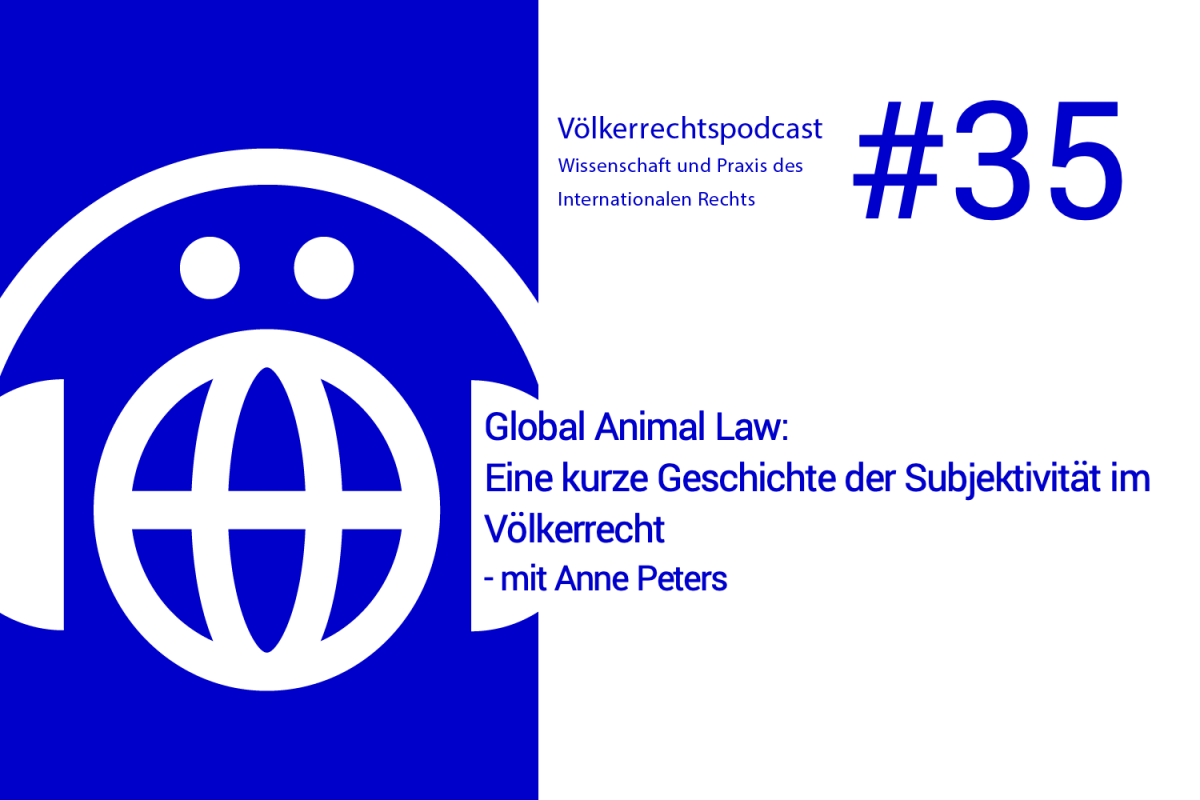#35 Global Animal Law: Eine kurze Geschichte der Subjektivität im Völkerrecht
Die industrielle Massentierhaltung ist ein Problem: Für den Klimawandel, für das Tierwohl und für die Gesundheit von Mensch und Tier. Deshalb beschäftigen wir uns in dieser Folge mit dem Rechtsgebiet, das sich dem globalen Problem aus völkerrechtlicher Perspektive nähert: dem Global Animal Law.
Im Interview spricht Erik Tuchtfeld mit Anne Peters vom Max-Planck-Institut in Heidelberg über mögliche Gründe für eine Anerkennung von Tierrechten, den Schutz von Tieren in bewaffneten Konflikten sowie Kritik am Global Animal Law als ein Projekt des Globalen Nordens. Im Grundlagenteil erklärt Isabel Lischewski, welche Bedeutung der Subjektivität historisch im Völkerrecht zukommt und wie sich das Konzept im Laufe der Zeit gewandelt hat.
Content Note: In dieser Folge wird zwischen 18:40 und 21:06 das Thema sexualisierte Gewalt angesprochen.
Wir freuen uns über Lob, Anmerkungen und Kritik an podcast@voelkerrechtsblog.org. Abonniert unseren Podcast via RSS, über Spotify oder überall dort, wo es Podcasts gibt. Es gibt die Möglichkeit, auf diesen Plattformen den Völkerrechtspodcast zu bewerten, wir freuen uns sehr über 5 Sterne!
Kapitelmarken:
(01:31) Grundlagenteil
(06:51) Interview – Einleitung
(07:59) Global Animal Law als Rechtsgebiet
(11:26) Tiere als Rechtssubjekte
(15:40) Rechtssubjektivität im Völkerrecht
(16:19) Tiere in bewaffneten Konflikten
(17:28) Warum sich gerade jetzt um Tierrechte kümmern?
(19:03) Gründe und Motivationen für die Misshandlung von Tieren
(21:06) Postkoloniale Kritik am Global Animal Law
(25:16) Tierschutz und Religionsfreiheit
(31:09) Ausblick und Perspektiven für das Global Animal Law
(33:58) Abmoderation
Hintergrundinformationen:
-
EuGH, Centraal Israëlitisch Consistorie van België u. a. (Pressemitteilung), 2020
-
Peters, Rights of Human and Nonhuman Animals: Complementing the Universal Declaration of Human Rights, AJIL Unbound 2018, 355
Moderation: Erik Tuchtfeld, LL.M (Glasgow) & Jan-Henrik Hinselmann, LL.M. (NYU) Grundlagen: Dr. Isabel Lischewski Interview: Prof. Anne Peters & Erik Tuchtfeld, LL.M (Glasgow) Schnitt: Daniela Rau
Credits:

Erik Tuchtfeld is a research fellow at the Max Planck Institute for Comparative Public Law and International Law (Heidelberg) and head of the humanet3 research group. He is an editor at Völkerrechtsblog.

Jan-Henrik Hinselmann is a doctoral candidate at Georg-August-Universität Göttingen and an editor at Völkerrechtsblog.


Dr. Isabel Lischewski is an Editor and Podcast Co-Host at Völkerrechtsblog as well as a post-doctoral researcher focusing inter alia on gender, governance, and education in international and German public law at University of Münster.